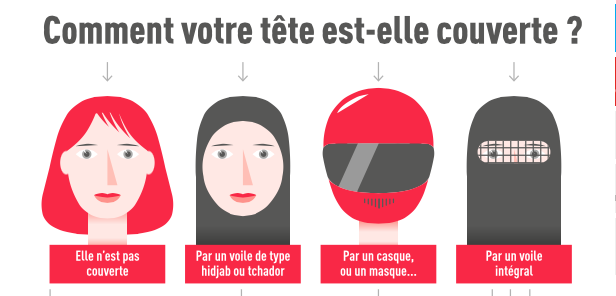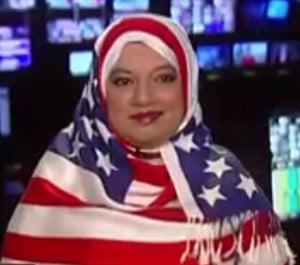The French “niqab” ban (burqa ban, whatever ban…call it what you will) of October 2010 has not faded away from the public consciousness in France at all. What I had originally hoped was just right-wing propaganda has turned out to be, since its entry into force in April 2011, part and parcel of a unique French interpretation of democracy and a revisionist version of French secularism, or laïcité. What started as laïcité was a series of what were originally anti-Catholic laws in 1882 and 1905, which became if not always in word, in deed, anti-Muslim laws and political positions, starting with the “headscarf affair” of 1989 (a decent overview is available on Wikipedia). The legislation of discrimination against Muslims parading as secularism, and the paranoia over niqabs, has gotten to the point to where private citizens are now taking it upon themselves to enforce the niqab ban. It is almost depressing to look over the number of posts I have written on the subject in the past five years (which are linked throughout the post), and to notice that things have changed for the worse.
First up on the vigilante justice scene is right-wing French politican Nadine Morano, who took it upon herself earlier this month to accost a woman in niqab and asking her to “respect the law.” While Nadine Morano freaking out about head coverings is part of the spectacle that is French politics (this is not her first rodeo in making hijab or niqab her own personal cause célébre), another bit of news that leaked recently is more troublesome. Specifically, some members of cast of La Traviata at the Paris Opéra refused to take the stage on October 3rd (the news just leaked last week) until a woman in niqab (a French media source speaks of a “face veil”) left the front row of the audience, which she apparently did without incident.
In the defense of the French, expelling the women is within the confines of the law (see the brochure in French here). In fact, the newspaper Libération has a handy graphic for those of us who may be confused.

Basically, in France, you can only legally cover your face in your house or in private places, which kind of defeats the purpose of niqab, although I do like the nifty Daft Punk helmet and am glad to know that dressing up like Daft Punk would in principle also be illegal (who are we kidding, this law is only for Muslims). I will note that the infographic is incorrect on one point: a woman in “just” a headscarf is not only not allowed into schools, she is also not allowed in public buildings like mayors’ offices, and she is not allowed on field trips with her children outside of school. This has nothing to do with the niqab ban.
The legality of what is a law on the books is not what I find problematic (well, not anymore, at least; I have had four years to get used to it). It bothers me that members of the general public, of which Ms. Morano, despite the fact that she is struggling to stay relevant (in fact, the police who took her complaint did not appear to know who she was) and these opera singers are a part, choose to take the law into their own hands, which for me is tantamount to harassment. In what other circumstances are “citizen arrest” situations generally expected? Robberies? Assaults? Is a woman in a niqab really on that kind of level?
As I have said in another post on the subject for MMW, worrying about Muslims and their clothing has become so commonplace and banal in France, as if they are the only ones in the entire country who have failed to understand the specificities of French secularism (or, that these are anti-Muslim laws cloaked under the veil of laïcité). Finally, it makes me sad that almost five years on from the niqab ban, I still don’t think this is about what people like to call laïcité, as I discussed in yet another post about France and its Muslims. Is the Opéra incident really about secularism, keeping religious symbols out of the public space, keeping France French? It’s not against Muslims, right, but rather their sacrosanct laïcité?
What is inherently wrong with a woman minding her own business, while her face happens to be covered? How can we interpret France’s niqab ban in any other way than discriminatory?











